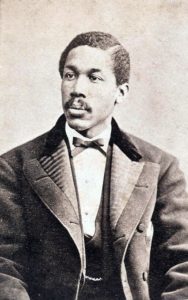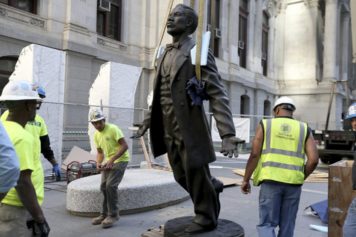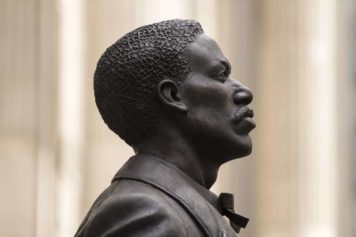
19th-century activist Octavius Catto. Wikipedia Commons.
Philadelphia Mayor Jim Kenney unveiled designs Friday for a 12-foot statue to honor one of the city’s most influential African-Americans.
Octavius Catto was a Renaissance man, dubbed the
“the Martin Luther King Jr. of the 19th century.” He was an educator, renowned public speaker, activist, baseball player and major for the National Guard before his untimely death in 1871, amid election day tensions.
The bronzed figure will serve as the centerpiece of a $1.5 million sculptural project conceived by California-based artist Branly Cadet, philly.com reports. Five granite pillars will stand behind Catto’s likeness, while a table bearing a ballot box made of stainless-steel sits before him. “A Quest for Parity” should be available for public viewing at City Hall by the end of the year, organizers said.
Octavius Valentine Catto was born on February 22, 1839, in Charleston, South Carolina. His father, William Catto, was a formally enslaved millwright who went on to become an influential Presbyterian minister, and his mother, Sarah Isabella Cain, belonged to the highly esteemed DeReef family in Charleston. The family eventually settled in Philadelphia in the 1850s, a time when the city claimed the nation’s largest population of free Blacks prior to the Civil War.
As such, Catto had access to an elite education at the nation’s first Black institution of higher education: the Institute for Colored Youth, a precursor to Cheyney University. Catto graduated as valedictorian in 1858 and went on to teach classes in English literature, mathematics and classical languages at his alma mater after spending some time furthering his education in Washington, D.C.
With the threat of Civil War looming, the decorated scholar became increasingly interested in politics and shepherded many significant human rights causes of the day for the Black community. When Confederate troops invaded Pennsylvania in 1863, he answered the state’s call for emergency troops by raising a company of Black volunteers, many of whom were his pupils. The skilled leader helped raise 11 all-Black infantries under the War Department’s Bureau of Colored Troops initiative to bring the Union Army to victory.
In continuing the fight to bring full citizenship and liberties to his people, Catto co-founded the National Equal Rights League in Syracuse, New York, alongside Frederick Douglass, John Mercer Langston and other eminent leaders in 1864. The civil rights organization was the first of its kind dedicated to the emancipation of all Blacks in America.
Following the war’s end, Catto pushed heavily for the desegregation of Philadelphia street cars. As part of his efforts, he and his fiancee regularly sat on street cars reserved for whites, refusing to move sometimes overnight and into the next day. In 1867, Pennsylvania legislators passed a law banning racially segregated public transportation.
Another cause dear to the leader, and one that ultimately led to his death, was ensuring the franchisement of Black men following the passage of the 15th Amendment in February 1871. Catto was fatally shot by Democratic Party operative Frank Kelly during Philadelphia’s first post-ratification election, when mobs of mostly Irish immigrants took to the streets to block African-Americans from exercising their newly obtained right.
This fact resonated with Philadelphia’s present-day Irish-American mayor, who had long championed for a memorial in honor of the fallen hero.
“There was this compelling need for me to rectify the injustice that was done to him and the fact that his contributions were ignored and not known by the general public for so long,” Kenney said, per ABC News.


